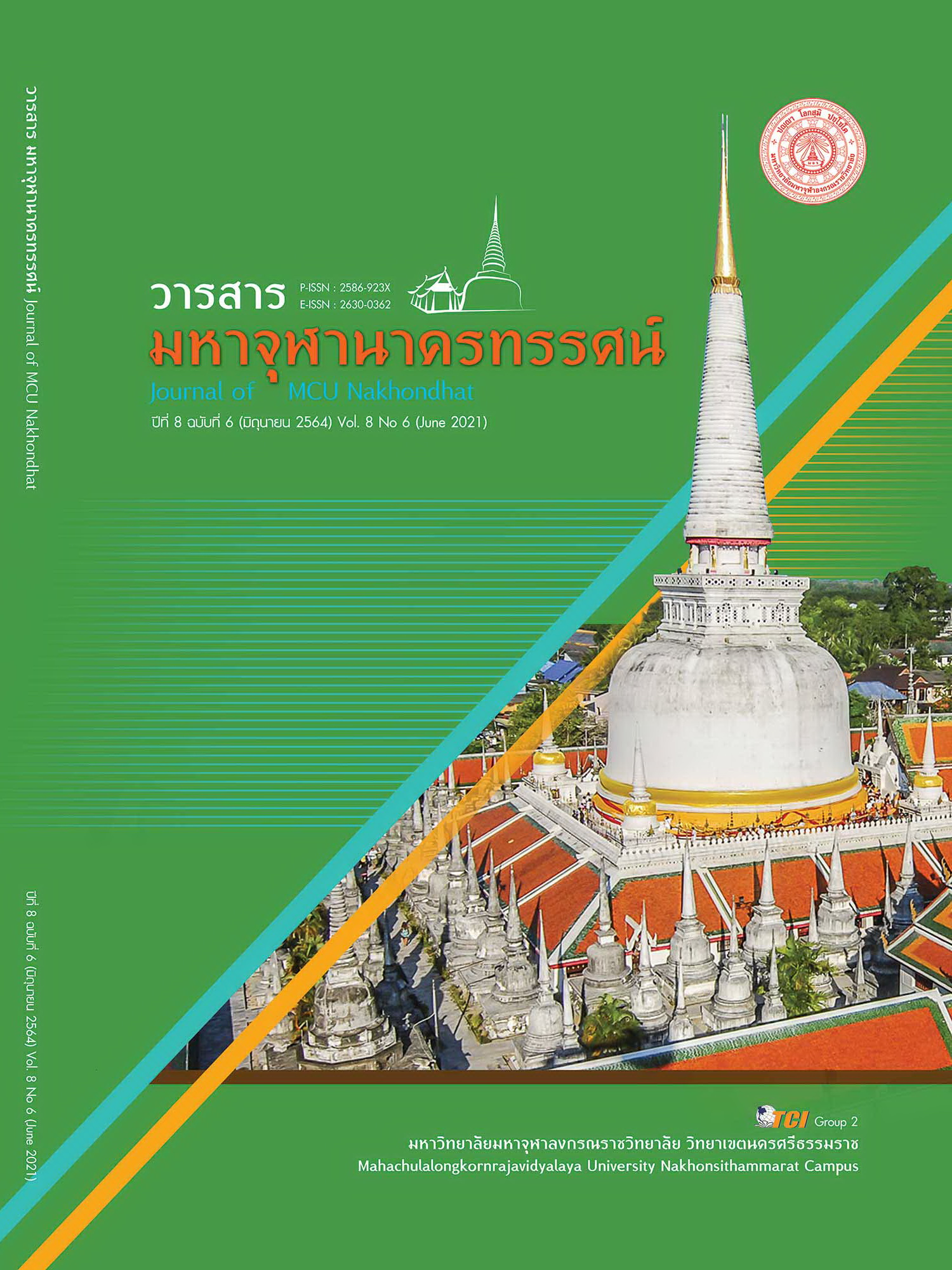BUDDHISM AFFAIRS REFORM IN PART GOVERMENT BY USE MAIN BRAHMA VIHARA DHARMA
Main Article Content
Abstract
Buddhism in Thailand has always been reformed since the Sangha Act 1941, including the Sangha Act 1962 and now the Sangha Act 2017. It is important that we Buddhists help each other to change. Including the push for Buddhism to be able to be a key principle in building people of all classes to live in equal coexistence. And to enable Buddhism to stay with Thai society as long as possible By government reform It is necessary to reform by using Buddhist principles which include "Brahma Vihara Dhamma" or Brahma Vihara 4 When this principle is used in the reform, there will only be ideas with orderly system including Buddhism under Reconciliation Helping each other in the time of suffering There is discomfort in the things that we stress. When applying these principles to therapy or to rejoice when others are doing well. Inevitably leads to a process of good thought Do good things to help achieve a happy coexistence. And finally, have a neutral mind to bring peace to Buddhism Regardless of which religion we are in, when we think systematically Would inevitably be good for that person Including those in that society For we have the principle of holding our hearts according to the motto that “rule with mercy. Please reasonably Has a heart of rejoicing with all the worshipers The goal is to reform people to trust impartiality. "
Article Details
References
คณะกรรมการประสานงานแผนยุทธศาสตร์ในการปฏิรูปกิจการพระพุทธศาสนา. (2560). แผนยุทธศาสตร์การปฏิรูปกิจการพระพุทธศาสนา. เรียกใช้เมื่อ 14 มกราคม 2564 จาก http://www.buddhism4.com/web/index.php/9-1/4-2017-10-21-19-13-40
ธรรมะไทย. (2560). พระพุทธศาสนาในประเทศไทย. เรียกใช้เมื่อ 13 มกราคม 2564 จาก http://www.dhammathai.org/thailand/thailand.php
พระครูปลัดไพฑูรย์ เมธิโก (มหาบุญ). (2557). พรหมวิหารธรรมแนวทางการแก้ไขความขัดแย้งของสังคมไทย. วารสารมหาวิทยาลัยนราธิวาสราชนครินทร์ สาขามนุษยศาสตร์และสังคมศาสตร์, 1(2), 55-64.
พระธรรมโกศาจารย์ (ประยูร ธมฺมจิตฺโต). (2549). พุทธวิธีการบริหาร. กรุงเทพมหานคร: โรงพิมพ์มหาจุฬาลงกรณราชวิทยาลัย.
พระพรหมบัณฑิต. (2559). การปฏิรูปกิจการพระพุทธศาสนา. เรียกใช้เมื่อ 25 มกราคม 2564 จาก https://www.mcu.ac.th/article/detail/261
. (2562). แนะปรับแผนปฏิรูปกิจการพระพุทธศาสนา. เดลินิวส์ออนไลน์ การศึกษา, 25. เรียกใช้เมื่อ มกราคม 2564 จาก https://www.dailynews.co.th/ education/728036
พระราชวรมุนี. (2560). แผนยุทธศาสตร์การปฏิรูปกิจการพระพุทธศาสนา 2560-2564 การนำนโยบายสู่การปฏิบัติ. เรียกใช้เมื่อ 24 มกราคม 2564 จาก https://www.posttoday.com/dhamma/513945
มิตซูโอะ คเวสโก. (2554). ธรรมะจากพระอาจารย์มิตซูโอะ คเวสโก. กรุงเทพมหานคร: อมรินทร์ธรรมะ.
วัชราภรณ์ นีละสมิตร. (2564). พรหมวิหาร 4 กับการบริหารงานในองค์กร. เรียกใช้เมื่อ 24 มกราคม 2564 จาก https://www.softbankthai.com/Article/Detail/661
วิชัย สอนเรือน. (2561). ปฏิรูปกิจการพระพุทธศาสนาด้านการปกครอง. เรียกใช้เมื่อ 25 มกราคม 2564 จาก https://siamrath.co.th/n/37912
สมเด็จพระพุทธโฆษาจารย์ (ป. อ. ปยุตฺโต). (2560). พจนานุกรมพุทธศาสน์ ฉบับประมวลศัพท์ (พิมพ์ครั้งที่ 31). กรุงเทพมหานคร: บริษัทสหธรรมิกจำกัด.
สำนักงานพระพุทธศาสนาแห่งชาติ. (2562). ข้อมูลพระและวัดทั่วประเทศ. เรียกใช้เมื่อ 16 มกราคม 2564 จาก https://www.onab.go.th/th/page/item/index/id/1


